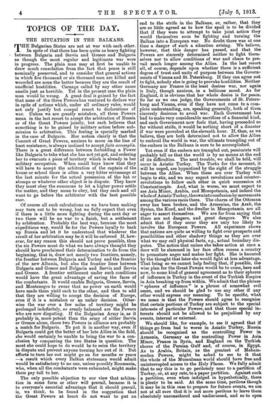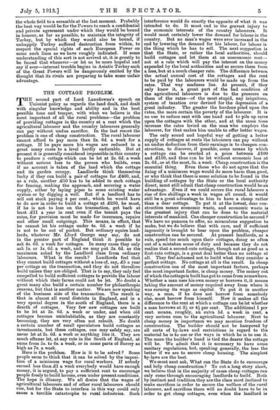TOPICS OF THE DAY.
THE SITUATION IN THE BALKANS. THE Bulgarian States are not at war with each other. In spite of that there has been quite as heavy fighting between Bulgaria and Servia and Greece and Bulgaria as though the most regular and legitimate war were in progress. The plain man may at first be unable to draw much consolation from the fact that peace is still nominally preserved, and to consider that general actions in which five thousand or six thousand men are killed and wounded are none the better because they are the result of unofficial hostilities. Carnage called by any other name smells just as horrible. Yet in the present case the plain man would be wrong. A great deal is gained by the fact that none of the three Powers has ventured to declare war in spite of actions which, under all ordinary rules, would not only justify but compel resort to declarations of war. Unless we are greatly mistaken, all three Powers mean in the last resort to accept the arbitration of Russia or of the Great Powers jointly, but each believes that something is to be gained by military action before sub- mission to arbitration. This feeling is specially marked in the case of Bulgaria. Her notion clearly is that the Concert of Great Powers, anxious to move on the line of least resistance, is always inclined to accept faits accomplis. There is a great difference between forbidding a Power like Bulgaria to take what she has not yet got, and ordering her to evacuate a piece of territory which is already in her military occupation. When small boys know that they will have to accept the arbitration of the captain of the house or school there is often a very bitter scrimmage at the last minute for the actual possession of the bat or stumps or whatever other object is in dispute. They know they must obey the summons to let a higher power settle the matter, and they mean to obey, but they each and all want to go before the arbitrator with the best possible case.
Of course all such calculations as we have been making may turn out to be wrong, but we fully expect that even if there is a little more fighting during the next day or two there will be no war to a finish, bbut a settlement by arbitration. Probably the best way, because the most expeditious way, would be for the Powers loyally to back up Russia and let it be understood that whatever the result of her arbitration may be it will be enforced If, how- ever, for any reason this should not prove possible, then the six Powers must do what we have always thought they should have proclaimed their determination to do from the beginning, that is, draw not merely two frontiers, namely, the frontier between Bulgaria and Turkey and the frontier of the new Albania, but also the frontier lines between Bulgaria and Greece and Bulgaria and Servia and Servia and Greece. A frontier settlement under such conditions would have the great advantage of saving the faces of the combatants. It would enable Bulgaria, Greece, Servia, and Montenegro to swear that no power on earth would have made them yield each to the other, and then to add that they are willing to accept the decision of Europe, even if it is a mistaken or an unfair decision. Other- wise the war over a few miles of territory might be prolonged indefinitely, so evenly balanced are the Powers who are now disputing. If the Bulgarian Army is, as it probably is, more potent than the army of either Servia or Greece alone, those two Powers in alliance are probably a match for Bulgaria. To put it in another way, even if Bulgaria could get the better of her late Allies in the field, she would certainly be unable to bring the war to a con- clusion by conquering the two States in question. The most she could hope to do would be to seize the territory in dispute and prevent anyone turning her out of it. But efforts to turn her out might go on for months or years —a result which every Balkan statesman would admit would be satisfactory to no one, unless possibly Roumania, who, when all the combatants were exhausted, might make them pay toll to her.
The only possible objection to our view that arbitra- tion in some form or other will prevail, because it is to everyone's essential advantage that it should prevail, is, we think, to be found in the suggestion that the Great Powers at heart do not want to put an end to the strife in the Balkans, or, rather, that they are so little agreed as to how the spoil is to be divided that if they were to attempt to take joint action they would themselves soon be fighting and turning the Balkan into a European war. No doubt there was at one time a danger of such a situation arising. We believe, however, that this danger has passed, and that the Powers are sincerely determined neither to fight them- selves nor to allow conditions of war and chaos to pre- vail much longer among the Allies. In the last resort all, of course, depends upon whether there is a sufficient degree of trust and unity of purpose between the Govern- ments of Vienna and St. Petersburg. If they can agree not to fight, nobody else is going to provoke hostilities. Neither Germany nor France in the least desires war, nor again is Italy, though anxious, in a bellicose mood. As for England, it is obvious that her whole desire is for peace. So far as we can judge, the Governments of St. Peters- burg and Vienna, even if they have not come to a com- plete understanding, are, speaking generally, both of them sincerely desirous to avoid war. Each Government has had to make very considerable sacrifices of a financial kind, and each Government now feels that, having proceeded so far without strife, it would be nothing short of a disaster if war were provoked at the eleventh hour. If, then, as we believe, they are both determined not to allow the Allies to embroil the world in war, the ultimate trampling out of the embers in the Balkans is sure to be accomplished.
Yet even if the embers are trampled out, pessimists will probably tell us that the world is by no means at the end of its difficulties. The next trouble, we shall be told, will occur in Asiatic Turkey. The Turks for the moment, it will be urged, are hypnotized by the sight of the struggle between the Allies. When these are over Turkey will begin to stir, and we may expect revolutions and counter- revolutions to follow each other in quick succession at Constantinople. And, what is worse, we must expect to see Asia Minor, Arabia, and Mesopotamia, and indeed the whole of Asiatic Turkey, thrown into confusion by movements among the various races there. The charm of the Ottoman sway has been broken, and the Armenian, the Arab, the Syrian, the Kurd, and the dweller in Mesopotamia. are all eager to assert themselves. We are far from saying that there are not dangers, and great dangers. We also admit that if they occur they are only too likely to involve the European Powers. All experience shows that nations are quite as willing to fight over prospects and possibilities and other shadowy things as they are over what we may call physical facts, e.g., actual boundary dis- putes. The notion that unless she takes action at once a door will be slammed in her face often rouses a country to premature anger and makes her fight. She is haunted by the thought that later she would fight at less advantage. That being so we cannot help feeling that, if possible, the wise plan for the Great Powers would be to come, here and now, to some kind of general agreement as to their spheres of influence in Turkey in the event of the Turkish Empire in Asia breaking up from within. We admit that the phrase " spheres of influence " is a phrase of somewhat evil omen, and we should be glad to use any other if any other would express our meaning. To be specific, what we mean is that the Powers should agree to recognize that certain portions of Turkey are subject to the special interests of particular Powers, and that those special in- terests should not be allowed to be prejudiced by any events, internal or external.
We should like, for example, to see it agreed that if things go from bad to worse in Asiatic Turkey, Russia should be recognized as the controlling Power in Armenia, Germany as the controlling Power in Asia Minor, France in Syria, and England on the Turkish shores of the Persian Gulf and, of course, in Egypt. As to Arabia, Britain, as the greatest of Moham- medan Powers, might be asked to see to it that the whole of the Mussulman world should have free and uninterrupted access to the Holy Places. We fully admit that to say this is to go perilously near to a partition of Turkey, or, at any rate, to a paper partition. Against such a partition, even when indulged in hypothetically, there is plenty to be said. At the same time, perilous though it may be in this case to prepare for future events, we are not at all sure that it is not more perilous to leave them absolutely unconsidered and undiscussed, and so to open the whole field to a scramble at the last moment. Probably the best way would be for the Powers to reach a confidential and private agreement under which they would be bound in honour, as far as possible, to maintain the integrity of Turkey, but by which they would also be bound, if unhappily Turkey suffered destruction from within, to respect the special rights of each European Power on some such lines as we have roughly indicated. If some understanding of this sort is not arrived at, it is greatly to be feared that whenever—or let us be more hopeful and say if ever—internal trouble begins in Asiatic Turkey each of the Great Powers will be dangerously excited by the thought that its rivals are preparing to take some unfair advantage.



















































 Previous page
Previous page